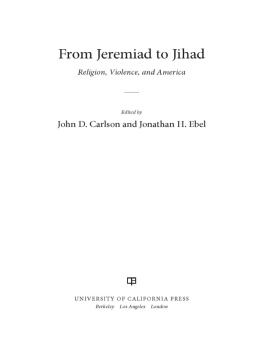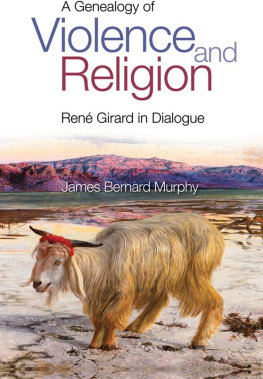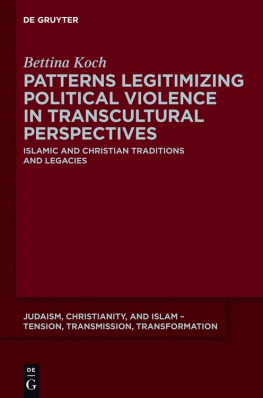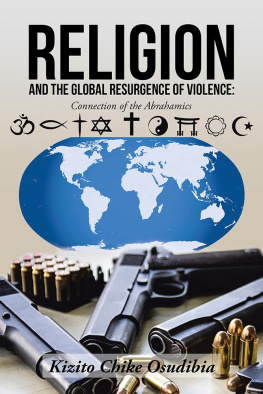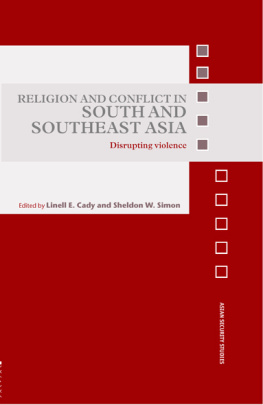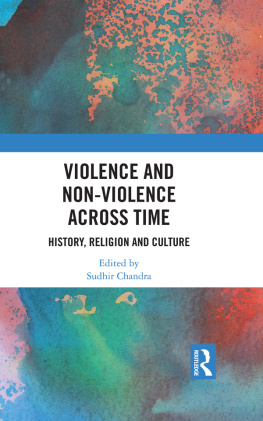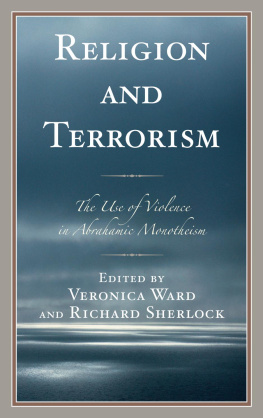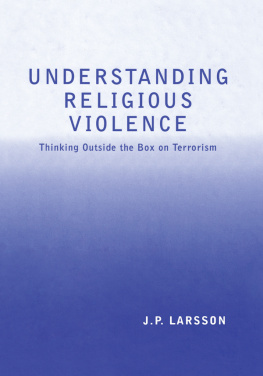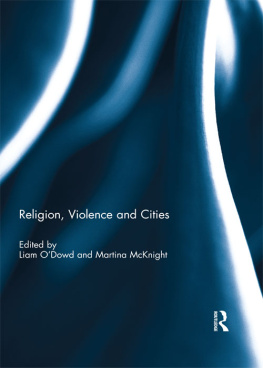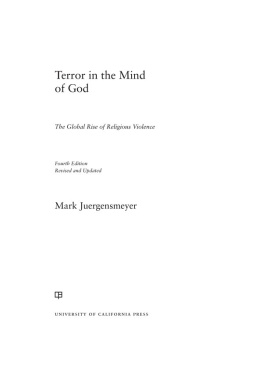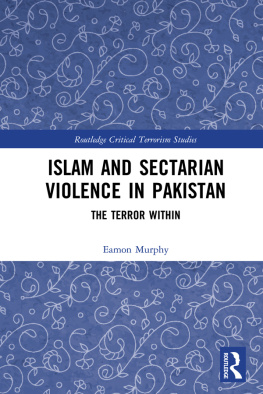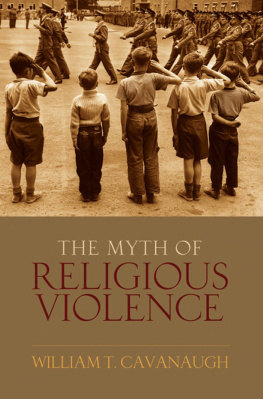1

From King Philip's War
to September 11
Religion, Violence, and the American Way
Andrew R. Murphy and Elizabeth Hanson
As a religious problem, the problem of suffering is, paradoxically, not how to avoid suffering but how to suffer, how to make of physical pain, personal loss, worldly defeat, or the helpless contemplation of others' agony something bearable, supportablesomething, as we say, sufferable.
CLIFFORD GEERTZ, RELIGION AS A CULTURAL SYSTEM
Clifford Geertz suggests an intimate connection between religion and suffering, a problem of interpretation central to any consideration of the relationship between religion and violence more generally. In like manner, many Americans, from the earliest days of colonial settlement down to the twenty-first century, have understood their nation as chosen to carry out God's purposes in human history. Thus Americans have often interpreted their nation's successes (including the successful exercise of violence against other peoples) as signs that God approves of the nation's spiritual state. But a special relationship and special purposes imply special responsibilities; and thus Americans have also often interpreted episodes of violence and other misfortunes as punishment sent by God in order to chastise this chosen people for failing to live up to the terms of their covenant.
The jeremiad (and the view of history that undergirds it ) is based on two crucial claims. First, the epistemological aspect of the jeremiad involves a claim that humans, with some degree of certainty, can read God's purposes in earthly events; these events, properly interpreted, provide a way to assess the spiritual health of a given community. Second, the ethical-theological component of the jeremiad presumes that God's purposes encompass the use of violence in the pursuit of religious and divinely ordained political ends. Somewhere in the convergence of these two assumptions lies the power of the jeremiad to accomplish what Geertz saw as religion's central power, that of making suffering sufferable. At the same time, it can become deeply problematic when such certainty about God's will is combined with exhortation about the moral and religious dimensions of violence. Decoupling the epistemological from the ethical-theological claims makes possible important variations on the standard jeremiadic formula, as becomes evident through a consideration of Abraham Lincoln (who questioned the jeremiad's epistemological pillar) and Martin Luther King Jr. (who questioned its ethical-theological one). These latter variations suggest novel and creative ways of reframing how the jeremiad relates religion and violence in the American tradition.
WINTHROP'S MODEL AND THE CITY ON A HILL
Notions of a chosen America go back to the earliest days of colonization. John Winthrop's sermon A Model of Christian Charity, delivered on board the Arbella in 1630, provides the most famous reference to the American settlement as a city on a hill. These settlements about which Winthrop was so concerned grew and flourished over the subsequent decades. But the covenant was always on the minds of the colony's ruling elite, and, given their providentialist world-view, New Englanders often interpreted their misfortunescrop failures, Indian attacks, diseases, and epidemicsas signs of God's wrath at their failure to live up to the godly standards set by the founding generation. Thus was born the American jeremiad, an American variant on the long-standing rhetorical form that the Puritans brought with them from England.
In New England, the jeremiad most often appeared in the form of an occasional sermon. Authorized by the civil government, occasional sermons were delivered during significant public events. They were solidarity rituals that cemented religious piety and politics in one public event.
KING PHILIP'S WAR: RELIGION AND VIOLENCE
IN EARLY NEW ENGLAND
Of the clergy likely to be called on to deliver occasional sermons in the generation following Winthrop, none played a more significant role in the colonies' public life than Increase Mather. Mather, the son of Richard Mather and son-in-law of John Cotton, both celebrated figures of early Massachusetts Bay, was a towering figure in New England society. And though he spoke in the style of a prophet, it is unlikely that Mather knew how prophetic his 1674 sermon The Day of Trouble Is Near would turn out to be. By war's end fully half of the towns in New England were damaged severely, and twelve were completely laid waste; the economy was in shambles, with the colonial treasuries near bankruptcy. Hundreds of English colonists (and far more Native Americans) were dead, wounded, or in captivity.
These grim details were in the future on the day that Mather preached in Boston. What Mather saw all around him were the sins of a once-godly people and their breach of the covenant into which the colony's founders had entered. Mather called attention to a great decay as to the power of godliness amongst us; spiritual and carnal pride in apparel, fashions, and the like; disobedience within families, churches, and the commonwealth; insensitivity to the poor; and growing contentiousness and disunity.
Mather took his sermon text from Ezekiel and noted that, although in scripture the Chaldeans had inflicted judgment on Israel, the ultimate source of their punishment was God, who sent the Chaldeans as punishment for the Israelites' sins. Not destroy, perhaps, but Mather felt sure that God was preparing to afflict New England.
Affliction came when armed hostilities began in 1675. By the spring of 1676, the Wampanoags and their allies were within ten miles of Boston. Although the jeremiadic emphasis on divine punishment had been a staple of New England public life for decades, the experience of King Philip's War pointed out just how terrible God's punishments could be. Between the spring of 1675 and the summer of 1676 scores of New England towns were burned, their inhabitants attacked and killed. When King Philip himself was killed in August 1676, hostilities came to a rapid conclusion. Shortly thereafter New Englanders began to produce histories of the war, trying to understand what had happened and why. One of the first came from the pen of Increase Mather. Mather's account painted a portrait of the violence unleashed on both sides: for Mather, New England had been both a recipient of God's violence, delivered by the Wampanoags, and an agent of divinely sanctioned violence inflicted upon the natives.
In such a providential framework, God rewarded righteousness with military victory, peace, and prosperityand punished pride and disobedience with violence at the hands of the Indians.
When New Englanders found themselves on the receiving end of violence, they sought to understand it by way of the same providential framework. At times God seemed to be punishing New Englanders for their waywardness by inflicting violence upon them at the hands of King Philip's warriors. In one incident, a settler named Wright refused to seek shelter at the garrison with the other inhabitants of his town when the Indians arrived; instead, he had a strange confidence or rather conceit, that whilest he held his Bible in his hand, he looked upon himself as secure from all kinde of violence; and that the Enemy finding him in that posture, deriding his groundlesse apprehension or folly therein, ript him open, and put his Bible in his belly. Wright's prideful approach to scripture provoked God's wrath against him, making him the object of divine violence, and a cautionary example to others.
Although the example of Wright's disembowelment made for sensational moral instruction, more typically, and in keeping with the social emphasis of the jeremiad tradition, chastening violence was interpreted by the entire community as punishment for collective sins. Even as they endeavored to mend their ways, their misfortunes at the hands of the Indians served as a yardstick by which to measure God's anger with them. Mather noted that a day of prayer and humiliation was observed Dec. 2, when also something happened intimating as if the Lord were still angry with our prayers, for this day all the houses in Quonsickamuck were burnt by the Indians.

